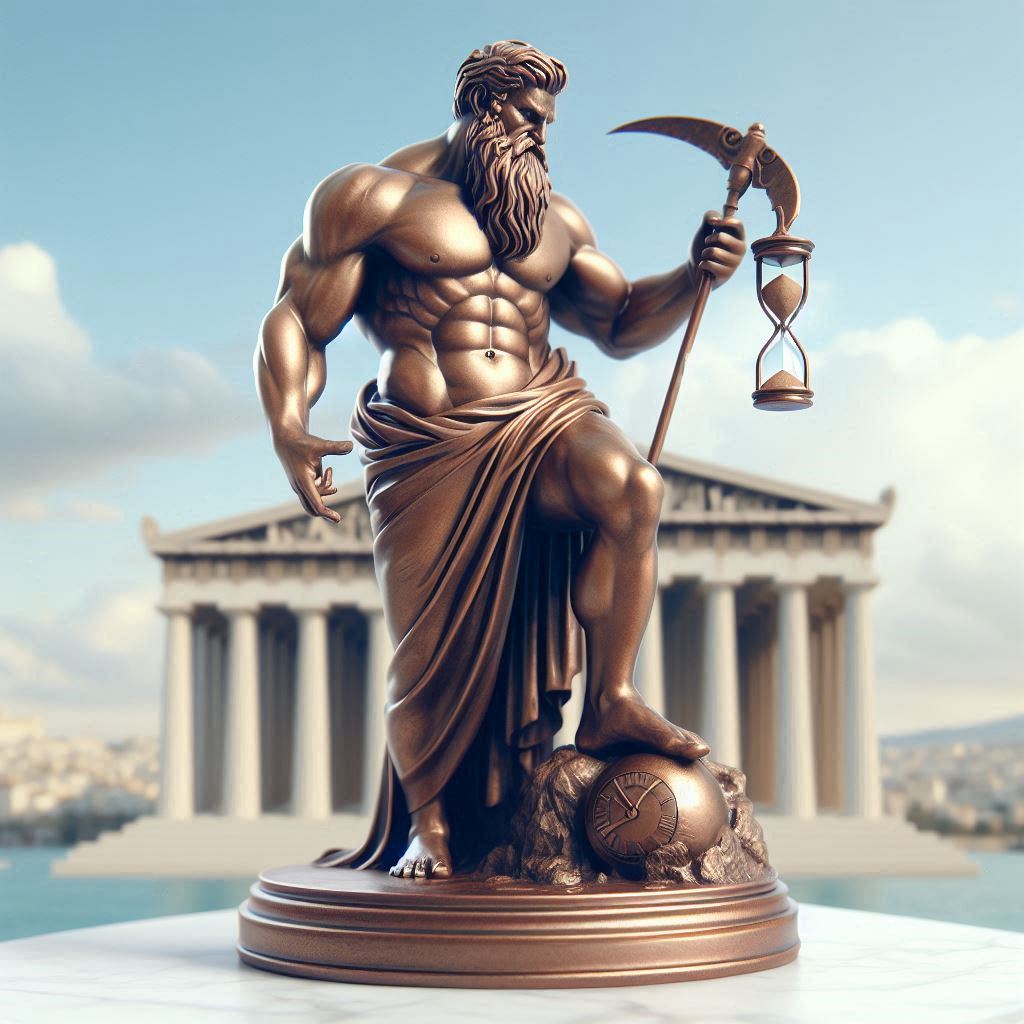Table of Contents
- Introduction
- The Rise of Cronus: Usurper of Uranus
- Rhea: The Sister and Wife of Cronus
- Cronus' Powers: The Titan of Space and Time
- Devouring His Children: A Fearful Prophecy
- The Defeat of Cronus and the Rise of Zeus
- Legacy of Cronus: Time and Eternal Cycles
- Conclusion
Introduction
Cronus, also known as Kronos, stands as one of the most enigmatic figures in Greek mythology. As the youngest of the Titans, Cronus ruled the cosmos during the Golden Age. However, his reign was marked by acts of power, betrayal, and fate—most famously, his role in consuming his own children to avoid a prophecy of his downfall.
Through his association with time, space, and cosmic cycles, Cronus represents both the destructive and cyclical nature of existence. This blog will delve into his myth, powers, relationships, and lasting legacy in both mythology and popular culture.
 Titan Cronus is associated with time, space, and cosmic cycles
Titan Cronus is associated with time, space, and cosmic cycles
The Rise of Cronus: Usurper of Uranus
Cronus’ story begins with his bold usurpation of his father, Uranus. According to myth, Uranus was the primordial god of the sky, who imprisoned many of his offspring, including the Cyclopes and the Hecatoncheires, deep within the earth. His cruelty angered his wife, Gaia (the Earth), who plotted with her children to overthrow him. Only Cronus, the youngest and most ambitious of the Titans, dared to act.
Armed with a sickle given to him by Gaia, Cronus ambushed Uranus and severed him from the heavens, effectively dethroning him. With this act, Cronus became the ruler of the cosmos, ushering in what was known as the Golden Age—a period of peace, prosperity, and order. However, his reign would soon become tainted by fear and tyranny.
Rhea: The Sister and Wife of Cronus
Rhea, both sister and consort of Cronus, played a significant role in the unfolding of the prophecy that shaped their tragic family. She was a Titaness associated with fertility, motherhood, and the nurturing aspects of life. Together, Cronus and Rhea had six children: Hestia, Hera, Demeter, Poseidon, Hades, and Zeus. However, Cronus’ actions soon strained their relationship.
According to a prophecy, one of their children was destined to overthrow Cronus, just as he had overthrown his father. Consumed by fear, Cronus took drastic measures to prevent this fate. As each of their children was born, he swallowed them whole, trapping them in his stomach.
Rhea, distraught by the loss of her offspring, devised a plan to save her youngest child, Zeus. She secretly gave birth to Zeus in a hidden cave and presented Cronus with a stone wrapped in swaddling clothes, which he swallowed, believing it to be his son.
Cronus' Powers: The Titan of Space and Time
Cronus is often associated with the control of time and space, symbolizing the inevitable passage of time and the cyclical nature of life and death. In ancient Greek mythology, he is linked to the concept of "Chronos" (Time), although the two are distinct figures. His sickle, used to dethrone Uranus, became a symbol of the passage of time and mortality—a reminder that time, like Cronus, consumes everything.
Cronus' reign as the ruler of the cosmos was tied to the very fabric of the universe, with his influence stretching across both the physical and temporal realms. As the father of Zeus and the Olympian gods, he played a critical role in the cosmic order, balancing the forces of creation and destruction.
Devouring His Children: A Fearful Prophecy
The act of consuming his children is perhaps the most iconic and terrifying aspect of Cronus' myth. Driven by the fear of the prophecy that foretold his downfall, Cronus’ decision to eat his offspring became a symbol of his desperate attempt to control fate. Each child he devoured represented not only his fear but also his desire to maintain power at any cost.
This gruesome act demonstrates the darker side of Cronus’ character—the lengths he would go to in order to avoid his own demise. But fate, as it often does in Greek mythology, cannot be avoided. Cronus' attempts to stave off his destiny only delayed the inevitable.
The Defeat of Cronus and the Rise of Zeus
Rhea’s cunning plan succeeded, and Zeus grew to adulthood, hidden from Cronus. When the time was right, Zeus returned to confront his father, using a potion provided by the goddess Metis to force Cronus to regurgitate his siblings. Together with his brothers and sisters, Zeus waged a great war against the Titans, known as the Titanomachy.
After a long and fierce battle, the Olympians triumphed, and Cronus was overthrown, fulfilling the prophecy. Zeus imprisoned Cronus and the other Titans in Tartarus, a deep abyss in the Underworld. Thus, the reign of the Titans came to an end, and the age of the Olympian gods began.
 Cronus chained in Tartarus , Underworld
Cronus chained in Tartarus , Underworld
Legacy of Cronus: Time and Eternal Cycles
Even after his defeat, the legacy of Cronus endures in mythology and symbolism. As the Titan associated with time, Cronus represents the inescapable cycles of life: birth, growth, death, and rebirth. His actions, particularly the devouring of his children, serve as a reminder of the destructive and consuming power of time itself.
Cronus’ story also reflects the themes of generational conflict and the inevitability of change. Just as he overthrew his father, Uranus, Cronus was in turn overthrown by his own son, Zeus, highlighting the eternal struggle between the old and the new.
Conclusion
Cronus is a figure of complex contradictions—a symbol of both the nurturing Golden Age and the fearsome devourer of gods. His mythology reminds us of the relentless nature of time, fate, and power. Despite his fall from grace, Cronus’ story endures, representing the eternal cycles of creation and destruction that define both the universe and human life.

